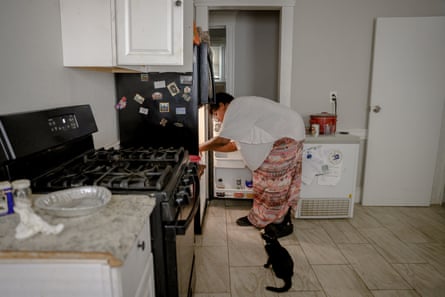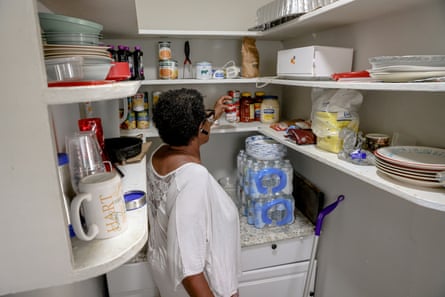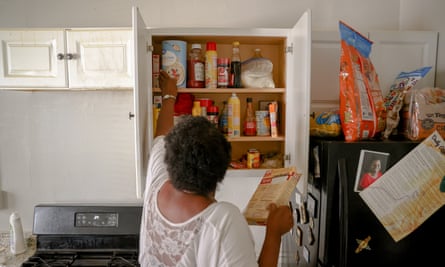
‘I felt like I failed’: inflation places wholesome meals out of achieve for hundreds of thousands of American citizens | US information
In April, Kimberly Hart made a answer to lose some weight at the recommendation of her physician. Hart, who’s 61 and lives in New Haven, Connecticut, has hypertension and ldl cholesterol. Those components, blended along with her age and weight, put her at an increased possibility for growing diabetes, and he or she sought after to do no matter she may to forestall that from taking place.
One component inside of her keep an eye on, Hart idea on the time, used to be her food regimen. She began seeing a nutritionist, a price lined by means of Medicaid, and consuming extra healthily. But it surely wasn’t lengthy ahead of her efforts clashed with the truth of emerging grocery prices.
In Would possibly, Hart started to truly really feel the pinch of upper costs, and by means of June, she discovered she needed to utterly upend the way in which she put meals at the desk for her and her son.

She swapped wheat bread for store-brand white bread, “which is simply too unhealthy” she mentioned, “as a result of I do know that wheat bread is more healthy for me, however I additionally know that white bread is inexpensive”. She switched from frozen greens to inexpensive canned ones, in spite of decrease dietary worth and better sodium content material, and now not buys contemporary fruit. 4 months since her April answer, she mentioned, the size hasn’t budged.
“The extra colour a plate has the more healthy it’s, since you get your colour from contemporary greens,” she mentioned. However as a result of her monetary scenario, “I will be able to’t truly do this”.
Inflation is pushing wholesome consuming out of achieve for hundreds of thousands of other people like Hart, a development that public well being professionals fear may build up their possibility for diet-related illnesses ultimately. Over the last 12 months, grocery costs have risen all of a sudden as agricultural provide chains bowed below the power of meals shortage, exertions shortages and prime gas prices.
Via the tip of July, the price of consuming meals at house had larger by means of greater than 13{614fc3c32b079590f5b6a33afe99f1781dd92265c15f5c1e8aa861cac1d0c269} in comparison to the similar length a 12 months in the past, in keeping with the Client Worth Index. Consistent with a survey performed by means of the City Institute in June and July, greater than 20{614fc3c32b079590f5b6a33afe99f1781dd92265c15f5c1e8aa861cac1d0c269} of adults reported experiencing meals lack of confidence inside the previous 30 days, an build up of greater than 6{614fc3c32b079590f5b6a33afe99f1781dd92265c15f5c1e8aa861cac1d0c269} from spring of ultimate 12 months.
It could appear counterintuitive however scientists have lengthy pointed to hyperlinks between poverty and weight problems. This week, the Biden management introduced a countrywide approach to take on the rustic’s “pressing, nutrition-related well being disaster”, together with the “emerging occurrence” of diet-related illnesses equivalent to weight problems.
According to larger costs, persons are purchasing inexpensive, processed meals prime in energy, sugar and sodium over more expensive choices like vegatables and fruits, protein and entire grains, in keeping with public well being researchers and anti-hunger professionals.
“Extremely processed meals are nonetheless essentially the most reasonably priced for other people and they are able to stretch longer and they have got an extended shelf existence,” mentioned Mariana Chilton, professor and director of the Middle for Starvation-Unfastened Communities at Drexel College. “Folks need to purchase wholesome meals, however then they make the selection to get meals that isn’t as wholesome however that remains at the shelf longer and will stretch and is helping their children really feel fuller.”

Over the long run, researchers have discovered that meals lack of confidence – outlined by means of the Division of Agriculture as unsure get entry to to nutritionally ok meals – is more than likely related to weight problems, a situation that during flip raises the danger of issues together with diabetes, center illness and strokes.
“Folks in the USA who’re extra meals insecure have larger charges of obese and weight problems,” mentioned Parke Wilde, a professor of meals and vitamin coverage at Tufts College. Wilde added that low-income other people with out get entry to to social protection methods are maximum harmed by means of inflation-driven meals lack of confidence, and its related well being dangers.
Whilst researchers have investigated the hyperlink between meals lack of confidence and weight problems for many years, precisely how the 2 problems are linked stays unsettled, Wilde mentioned. One clarification could also be within the uncertainty it brings. “Having a boom-and-bust cycle in how a lot meals you’ve got may have sends a sign in your frame that it must retain meals power, and that may put other people at larger possibility of obese and weight problems,” Wilde mentioned.
Anti-hunger advocates say that meals lack of confidence pushed by means of inflation illustrates the tough function that poverty performs in shaping nutritional alternatives and wholesome consuming, that have traditionally been framed as a question of person decision-making.
“There’s this feeling that low-income other people don’t know the way to consume,” mentioned Thomas Reynolds, the executive govt officer of Northwest Harvest, a community of 300 meals banks in Washington state. “I simply completely reject that. It’s truly about simply making very sensible choices, as a result of cash is so tight presently.”

Katrena Ross, 40, a felony assistant and mom of 3 residing in Redford, Michigan, first began being concerned about inflation in February. On the time, Ross used to be already straining to feed her circle of relatives on a per month price range of not up to $200, a scenario that made her particularly attuned to even the slightest value build up.
As costs started to upward thrust within the spring, Ross couldn’t find the money for to shop for as a lot contemporary produce and meat. As a substitute she reached for peanut butter and jelly, pasta, boxed macaroni and cheese and $1 ramen noodles – a meals she hadn’t bought in years.
“I would really like to mention that I consider what consuming like this could do to me and my children however that’s now not truly a luxurious that I’ve, as a result of I will be able to simplest consider: what am I feeding them now? What do I’ve to make certain that they don’t cross to mattress hungry?”
Public well being professionals emphasize that meals lack of confidence takes greater than only a bodily toll – it may even have destructive mental affects.
“Numerous other people simply consider weight problems, diabetes, metabolic syndrome, center illness and sure, all of the ones can get exacerbated, however a large number of other people have a tendency to overlook concerning the emotional penalties,” mentioned Chilton of Drexel College.
Ultimately, Ross made the verdict to transport her circle of relatives again house along with her mom and stepfather, a transfer that allowed the merged family to pool sources and shoulder the load of inflation in combination. It’s a call that still gave her a much-needed peace of thoughts.
“My talent not to give you the fundamentals for my circle of relatives like meals and conserving a roof … that used to be destroying my psychological well being,” Ross mentioned. “I felt like I had failed them. I felt like I couldn’t stay them secure or supply for them correctly, which for a mother or for any dad or mum truly, it truly hits your self esteem.”
Reynolds of Northwest Starvation mentioned that there are a lot of ways in which lawmakers can beef up the social protection web to be able to save you households like Ross’s from experiencing meals lack of confidence within the first position, in addition to assist them take care of the sudden prices of fast inflation.
“Poverty and starvation are so carefully linked, it’s virtually interchangeable,” he mentioned. He believes insurance policies equivalent to common fundamental revenue, loose faculty foods and better bills to other people within the Supplemental Vitamin Help Program (Snap, previously referred to as meals stamps) may bolster meals safety and make wholesome consuming extra reasonably priced.

For Hart, extra beneficiant Snap bills may make an important distinction to her existence. Sooner than the pandemic, she estimates she gained round $400 a month from this system. However her 20-year-old son lately were given a part-time task and the extra revenue led to their family advantages to drop. Her son is now bearing in mind taking a higher-paying place, one thing that she helps, however she worries that can result in even additional cuts of their per month Snap allotment.
“It’s a catch-22,” she mentioned. At the present time, she organizes her week round ready in traces for meals pantries, which she is dependent upon for added produce, dairy and meat.
Hart mentioned she feels demoralized that she hasn’t misplaced any weight since April. Infrequently, she lies to her nutritionist about following a more fit food regimen, simply to sidestep the truth that she will be able to’t in truth find the money for it. “Someday, I may get up diabetic,” mentioned Hart. “If I may simply consume more healthy … however I will be able to’t.”


